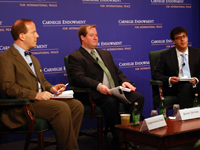Registration
You will receive an email confirming your registration.
IMGXYZ3214IMGZYXThe Nuclear Non-Proliferation Treaty (NPT) may be the cornerstone of international law relating to nuclear weapons, but disagreements over its meaning abound. Are the treaty’s nonproliferation strictures more important than its disarmament and peaceful use provisions? Just how inalienable is the right of states to use nuclear energy for peaceful purposes? And, what does the commitment to pursue negotiations in good faith on nuclear disarmament mean in practice?
To address these critical issues, Carnegie hosted a debate between Hudson Institute’s Christopher Ford and the University of Alabama School of Law’s Daniel Joyner on the legal interpretations of the NPT. Carnegie’s James Acton moderated.
The Treaty's Purpose
- The “three pillars”: The participants disagreed over whether the “three pillars” of the NPT – nonproliferation, disarmament, and the right to nuclear technology for peaceful purposes – are of equal importance.
- Holistic approach: Joyner argued that a “holistic” approach to treaty interpretation, including an examination of the diplomatic history of the treaty, demonstrates that these thee pillars are inherently linked and presumptively equal.
- Nonproliferation as cornerstone: Ford disagreed with the notion of three coequal pillars, arguing that nonproliferation is the conceptual and legal core of the NPT. He also pointed to the historical origins of the treaty, including the treaty’s mandate, which strongly prioritized preventing the proliferation of nuclear weapons.
Article IV and Peaceful Uses of Nuclear Energy
- The Lotus Principle: Article IV upholds a state’s right to nuclear energy for peaceful purposes. Joyner linked this article with the “Lotus Principle,” which grants states the right to do whatever is not actually prohibited. Therefore, he argued, Article IV provides the right of all states to develop, produce, and use peaceful nuclear materials and technologies, limited only by the clearly delineated obligations of Articles I and II.
- Greater restrictions: Ford said that Lotus is inapplicable here because non-nuclear weapon states agreed in Article IV that peaceful use rights must be "in conformity with Articles I and II," thus waiving any ability to claim peaceful use rights if in violation of these provisions. He said it would be plausible to read Article IV as enshrining the right to receive the benefits of nuclear technology, but not to receive any particular technology itself if this could not be adequately safeguarded.
Nuclear Disarmament
- Article VI: Article VI imposes an obligation on NPT signatories to pursue negotiations in good faith on effective measures relating to nuclear and total disarmament. The two participants disagreed over the obligations this article places on treaty signatories.
- Nuclear weapon states and noncompliance: Joyner interpreted the article as a legal obligation to pursue negotiations in good faith – i.e. proactively, diligently, sincerely, and consistently. Signatories must negotiate on effective measures related to: (1) cessation of the nuclear arms race, (2) nuclear disarmament, and (3) a treaty on general and complete disarmament under strict and effective international control. The arms control negotiations which have taken place to date are not the same as disarmament negotiations, he argued and as a result, nuclear weapon states are in noncompliance with their Article VI obligation.
- A shallow article: Ford stressed the relative shallowness of the article text, which merely calls on parties to pursue negotiations in good faith; specific disarmament steps are not required. Ford disagreed with Joyner’s conclusion that nuclear weapon states have breached their NPT legal obligations.
